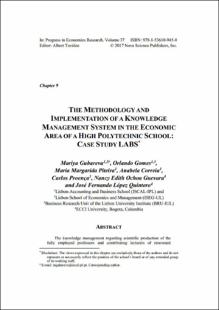Mostrar el registro sencillo del ítem
The Methodology and Implementation of a Knowledge Management System in the Economic Area of a High Polytechnic School: Case Study LABS
| dc.contributor.author | OCHOA GUEVARA, NANCY EDITH | |
| dc.contributor.author | LOPEZ QUINTERO, JOSE FERNANDO | |
| dc.date.accessioned | 2023-08-02T16:57:41Z | |
| dc.date.available | 2023-08-02T16:57:41Z | |
| dc.date.issued | 2017 | |
| dc.identifier.citation | APA | spa |
| dc.identifier.uri | https://repositorio.cun.edu.co/handle/cun/4063 | |
| dc.description.abstract | The knowledge management regarding scientific production of the fully employed professors and contributing lecturers of renowned universities is a well-established practice in the major developed countries. Still, substantial improvements in this field are desirable for high polytechnic schools of Southern Europe. This chapter presents a study on knowledge management and analyses trends of a scientific production in the economics and finance area at one of the Portuguese high polytechnic school, namely Lisbon Accounting and Business School (LABS). The data collection methodology regarding scientific research outcomes firstly was proposed and implemented at the economics and finance area. This data collection was based on the direct mail messages addressed to the effective teaching staff members followed by the individual and aggregate analyses of the obtained information regarding published works in the field of economics and finance. The time frame of scientific publications analyses spans over the period of 20 years, namely 1997 - 2016. Later the same methodology was also extended to cover the entire institution. The knowledge management system was implemented in all the knowledge-producing units of LABS. A special database was created to keep the records. It now allows for timely consultation by the administrative bodies of the institution. The main contribution of this study is to demonstrate that the right knowledge management in polytechnic schools is able to unleash hidden potentialities of the capacities evidenced through the implementation of the system of knowledge management. In practical terms, the aggregate results were presented in the form of a report entitled "Creating Knowledge", which was published on the Internet site of the institution. The main findings of this report "Creating Knowledge" were used in the promotion of the LABS towards potential students and represented one of the main factors of fully accomplished enrollment of students for all graduate courses of the LABS for the new academic year beginning in September 2016 at the first stage of the enrollment process. | eng |
| dc.format.extent | 30 paginas | spa |
| dc.format.mimetype | application/pdf | spa |
| dc.language.iso | spa | spa |
| dc.source | https://repositorio.ipl.pt/bitstream/10400.21/7557/1/4_Chapter_Mariya_Gubareva_KM_ISCAL.pdf | spa |
| dc.subject.ddc | Educación, investigación, temas relacionados | spa |
| dc.title | The Methodology and Implementation of a Knowledge Management System in the Economic Area of a High Polytechnic School: Case Study LABS | eng |
| dc.type | Capítulo - Parte de Libro | spa |
| dc.relation.references | Anand, A. and Singt, M. D.(2011) Understanding Knowledge Management: a literature review. International Journal of Engineering Science and Technology 3 (2), 926-939. | spa |
| dc.relation.references | Bardin, L, (1977). L´analyse de contenu. Paris: Press Universitaire de France. | spa |
| dc.relation.references | Bernal, L., Garcia, V., and Lopez Quindero, J. (2015), Knowledge Management and intellectual Capital in a University Context, Procedings of 10th International Conference Knowledge in Organizations (pp. 741-753) AG, Switzerland: Springer international Publishing | spa |
| dc.relation.references | Bratianu, C. (2009). The intellectual capital of universities. Annals of the University of Ljubljana. Ljubljana. | spa |
| dc.relation.references | European Commission (2003). The role of the Universities in the Europe of Knowledge (P.58) Brussels: COM. | spa |
| dc.relation.references | European Committee for Standardization (2009). The European Guide 10 Good Practice in Knowledge Management (Parts 1, 2, and 3). Retrieved from: http://www.cen.eu/Pages/defaultaspx. | spa |
| dc.relation.references | Jongbloed, B., Enders, J. and Salemo, C. (2008). Higher education and its communities: Interconnections, interdependencies and a research agenda. Higher Education, 56(3), 303-324. | spa |
| dc.relation.references | Omotayo, F. O. (2015), Knowledge Management as an important tool in Organizational Management: A Review of Literature. Library Philosophy and Practice (e-joumal), 1238. Retrieved from: http:/digitalcommons. unLeduflibohilorac/1238/ | spa |
| dc.relation.references | Marr, B., Gupta, O., Pike, S. and Roos, G. (2003). Intellectual capital and knowledge management effectiveness. Management Decision, 41(8), 771- 781. | spa |
| dc.relation.references | Ramirez, Y., Lorduy, C. and Rojas, JA. (2007). Intellectual capital management in Spanish Universities. Journal of Intellectual Capital, 8(4), 732-748. | spa |
| dc.relation.references | Ramirez, Y. (2011). New management in Spanish universities: introducing Balanced Scorecard. International Journal of Leaming and Intellectual Capital, 8(4), 359-377. | spa |
| dc.relation.references | Ramirez, Y. (2013). Intellectual capital management and reporting in European higher education institutions. Intangible Capital, 9(1), 1-19. Riege, A. (2007). Actions to overcome knowledge transfer barriers in MNCs. Journal of Knowledge Management, 12(1), 3-12. | spa |
| dc.relation.references | Rimes, H., Welch, J. and Bozeman, B. (2014). An alternative to the economic value of knowledge. In C. Antonelli and A. Link, A. (edn.), Routledge Handbook of the Economics of Knowledge (Pp. 154-165). London: Routledge. | spa |
| dc.relation.references | Sánchez, P., Elena, S. and Castrillo, R. (2009). Intellectual capital dynamics in universities: a reporting model. Journal of Intellectual Capital, 10(2), 307- 324. | spa |
| dc.relation.references | Stake, R. (1994). Case studies. In N.K. Denzin and Y S. Lincoln (Eds.), Handbook of Qualitative Research (Pp. 236-247). Thousand Oaks, CA: Sage. | spa |
| dc.relation.references | Tian, J., Nakamori, Y. and Wierzbicki, A. P. (2009). Knowledge management and knowledge creation in Academia: a study based on surveys in a Japanese research university. Journal of Knowledge Management, 1302), 76-92. | spa |
| dc.relation.references | Wu, H., Chen J. and Chen, L. (2012). Ways to promote valuable innovation: intellectual capital assessment for higher education system. Qual Quant, 46, 1377-191 Yin, R. (1994). Case study research. Design and methods. London: Sage. | spa |
| dc.rights.accessrights | info:eu-repo/semantics/closedAccess | spa |
| dc.type.coar | http://purl.org/coar/resource_type/c_2df8fbb1 | spa |
| dc.type.coarversion | http://purl.org/coar/version/c_ab4af688f83e57aa | spa |
| dc.type.content | Text | spa |
| dc.type.driver | info:eu-repo/semantics/bookPart | spa |
| dc.type.redcol | http://purl.org/redcol/resource_type/ART | spa |
| dc.type.version | info:eu-repo/semantics/acceptedVersion | spa |
| dc.rights.coar | http://purl.org/coar/access_right/c_14cb | spa |
Ficheros en el ítem
Este ítem aparece en la(s) siguiente(s) colección(ones)
-
BC. Artículos [172]

